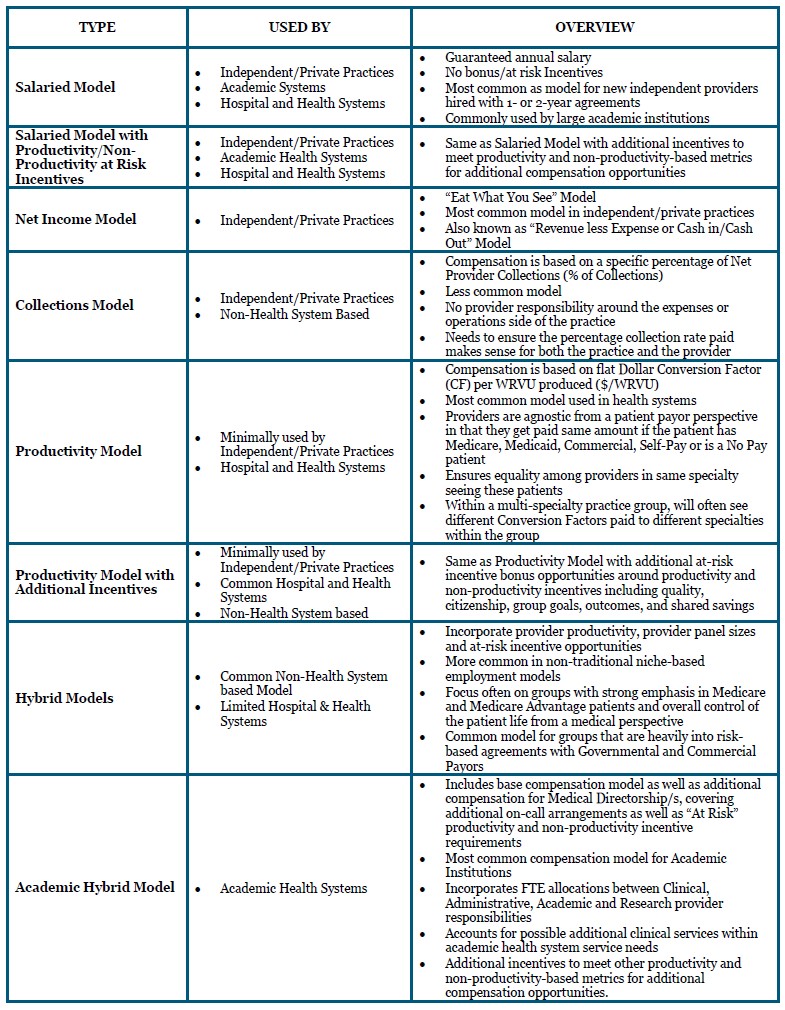A recently published study from Avalere, sponsored by the Physicians Advocacy Institute, showed that the percentage of U.S. physicians employed by hospitals, health systems or corporate entities grew from 62.2 percent in January 2019 to 73.9 percent as of January 2022. In 2021 alone, this number increased by approximately 4.6 percent. Since the pandemic started in early 2020, over 83,000 additional physicians became employees of hospitals or other corporate entities.
This rapid growth in the employment market provides us a natural opportunity to review the different types of compensation models that exist, both within this section of the healthcare market and elsewhere in the healthcare industry.
Compensation models can be broken down into three main categories of use:
- Independent/Private Practice that incorporates Shareholder as well as non-Shareholder Employment Models
- Hospital and Health System Employment Models
- Non-Health System, Non-Traditional Ownership-Based Employment Model

Legal Considerations in Compensation Models
When changing or revising a compensation model (even those being used for independent private practices), there are important legal considerations to keep in mind. These focus on The Stark Law ((42 U.S.C §1395nn) and The Anti-Kickback Statute (42.U.S.C. §1320a=7b(b)). Within these rules and regulations, the attention is on two main areas of compliance:
- Fair Market Value
- Commercial Reasonableness
The Stark Law prohibits a physician with a financial relationship with an entity that provides certain “designated health services” from referring patients to the entity.
The Anti-Kickback Statute makes it a felony to offer, pay, accept, or solicit payment for the referral of, or the arranging for, the referral of items, services, or patients reimbursed by any federal or state healthcare program.
Both AKS and The Stark Law contain exceptions for compensation arrangements that are fair market value and commercially reasonable, both of which are explained below.
Fair Market Value (FMV) – The price at which property would change hands between a willing buyer and willing seller when the former is not under any compulsion to buy and the latter is not under any compulsion to sell, both parties having reasonable knowledge of relevant facts.
Commercial Reasonableness (CM) – Where an arrangement is a sensible, prudent business agreement from the perspective of the parties involved, even in the absence of any actual or potential referrals.
When considering non-productivity metrics as mentioned in some of the models described above, it’s important to consider the effect on Fair Market Value and Commercial Reasonableness.
- FMV valuations rely heavily on industry surveys, so it is difficult to determine whether the surveys being used incorporate data from physicians who receive payment based on non-productivity-based metrics such as quality, satisfaction scores, governance, etc.
- As more and more Governmental and Commercial Payors use these types of metrics as a basis for reimbursement, then it is easier to justify them from a commercially reasonable perspective and to pay a physician for achievement of these types of metrics.
- “At Risk” Arrangements – if instead of qualifying the physician for additional payment, failure to achieve metrics results in a reduction in pay, this does not appear to implicate FMV concerns.
As employment models evolve and providers continue opting for employment versus independent practice, we would not be surprised to see completely new models emerge in the market, as well as variances to the models that already exist.
Either way, substantial time and effort will continue being spent in this area to ensure that all parties involved work together to implement models that meet the mission, vision and financial and operational objectives of the practices, groups and ownership entities.
Ronnen Isakov is Managing Director Advisory Service of MMG Healthcare Solutions / Medic Management Group. His background includes extensive work in areas including business advisory, valuation, network optimization, transaction support, and project management.